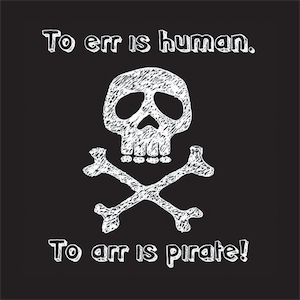Candide on a Pirateship
Information means power
Our society is an information Society. Adrian Johns says about information’s role: “[…] that information has indeed become a principal foundation of modern social, economic, and cultural order. As it has become the key commodity in the globalized economy, so control and management of information have vastly increased in overt importance.”[Johns, 2009:4] He emphasizes the notion of control: ‘To control information is power’ instead of just ‘Information is power’. Until recently it were mainly big institutions controlling this information. They used it to control us, as Foucault showed, with discipline and punish and thus shape our ideas about commercial, economical, political or cultural affairs. [Foucault, 1989: 301-304] Control information is to control the people.
Information can be hijacked
This so important information is mostly preserved in archives. Archives which are becoming more and more often electronic archives these days. Electronic archives have the capability of interactive users to enter it quite easily and edit it. The user can distribute and expand the archive as well. Arjun Appadurai shows in Archive and Aspiration that because of this, electronic archives influence identities, but do not control them.[Appadurai, 2003: 16/17] So one always has some control over information. No one can ever fully control the other in this way, because everyone is part of this collective memory.
Some of these archives are illegal ones, filled with nonlegal media. An example is www.aaaaarg.org, where big amounts of in copyright books are uploaded. Some people call this steeling, others call it sharing of information. Sure is that due to the interaction with other books or texts; the possibility to response and the fact that books can be placed in new contexts, a new form of paratext is facilitated. This causes this texts to be perceived in new ways. Ways that cannot be created by the institutions who used to create paratext: publishers. So in these electronic archives the old institutions are replaced by ‘pirates’ as the ones controlling the information.

“The pirates, in all too many cases, are not alienated proles. Nor do they represent some comfortingly distinct outsider.
They are us.” [ Johns, 2009: 4]
Attemps to stop piracy. Or: Attempts to stay in control
The institutions who are afraid to lose their power, invent all kinds of ways to regain their place in information distribution. The Stop Online Piracy Act for example. This law would allow copyright holders and the U.S. Government to shut down website that were, in their eyes, violating copyright laws. Due to protests the act was cancelled (or postponed) last year.
More recent examples of trying to regain power by controlling information flows, come from Google. Google has always supported the open internet, but it seems like business has become more import. They blocked AdBlock Plus, an anti-add software, from their android systems. The closing down of Google reader has raised some questions about their loyalty towards the debate as well, since RSS is losing a big companion with Google.
This month The Anti-piracy Copyright Alert System took off. It is a policy developed by some copyright organizations along with major internet service providers. The system sends a warning email when your downloading illegally and after a couple of ‘strikes’ it interferes with your bandwidth. This system’s main goal is to point out to naïve users, they are doing something illegal. Question is whether these users still exist.
All these measures have caused protest, especially SOPA. On Demand Progress, the protest focused on the censorship SOPA implies. Demand Progress fears it is a small step from closing down websites accused of copyright infringement, to closing down websites the organizations dislike. The blocking of blocked AdBlock Plusmade people use the term censorship as well.
In the Ideal world
I can only agree with Johns when he says: “What is at stake, in the end, is the nature of the relationship we want to uphold between creativity, communication, and commerce. […] It is hard to see how the situation can be resolved satisfactorily without changing the very terms in which society understands intellectual property and its policing.” [Johns, 2009: 5&15]
Copyright infringement needs to be stopped, just as the illegal collecting of data. At the same time the open internet has to be secured. Internet could be the ultimate democracy To accomplish this democracy both parties have to be willing to give up some control of information and with this some power. To speak with Bertrand Russell: “Construction and destruction alike satisfy the will to power, […]We construct when we increase the potential energy of the system in which we are interested, and we destroy when we diminish the potential energy. […], we all know in practice whether an activity is to be regarded as constructive or destructive, except in a few cases where a man professes to be destroying with a view to rebuilding and are not sure whether he is sincere.”[Russell, 1926: 85]
Yes this is dreaming of an ideal world. But we need to aspire to be able to construct.
Sources:
Appadurai, Arjun. ‘Archive and Aspiration, in: Joke Brouwer en Arjen Mulder (eds) Information is alive, Rotterdam: V2_Publishing/NAi Publishers, 2003, pp. 14-25.
Foucault, Michel. Discipline, Toezicht en Straf. Groningen: Historische uitgeverij, 1989. (Dutch version of Surveiller et punir : naissance de la prison)
Fuller, Matthew ‘In the Paradise of Too Many Books: An Interview with Sean Dockray’, Mute Magazine (May 2011), http://www.metamute.org/editorial/articles/paradise-too-many-books-interview-sean-dockray
Johns, Adrian. Piracy: The Intellectual Property Wars from Gutenberg to Gates, Chicago: University of Chicago Press, 2009, pp. 1-56.
Liang, Lawrence. ‘Beyond Representation: The Figure of the Pirate’, in: Gaëlle Krikorian and Amy Kapczynski (eds) Access to Knowledge in the Age of Intellectual Property, New York: Zone, 2010, pp. 353-375.
Russell, Bertrand. Education and the Good Life. New York: Boni & Liverright, 1926.
Sundaram, Ravi. ‘Revisiting the Pirate Kingdom’, Third Text 23.3 (2009): 335-345.
Swartz, Aaron. Guerilla Open Access Manifesto, 2008, Italy; http://archive.org/stream/GuerillaOpenAccessManifesto/Goamjuly2008_djvu.txt
Webb, Jen. Copying is a fact, not a problem. 2013; http://toc.oreilly.com/2013/02/copying-is-a-fact-not-a-problem.html?utm_source=feedburner&utm_medium=feed&utm_campaign=Feed%3A+tocblog+%28Tools+of+Change+for+Publishing%29
Mute Books Orders
For Mute Books distribution contact Anagram Books
contact@anagrambooks.com
For online purchases visit anagrambooks.com






